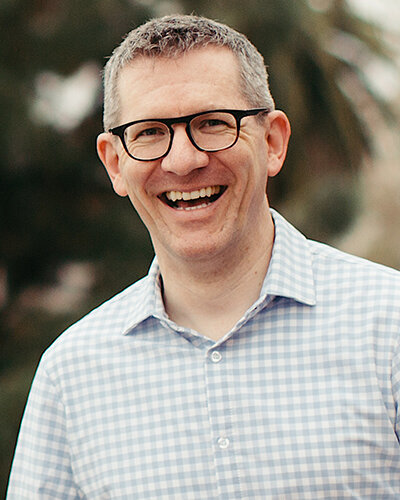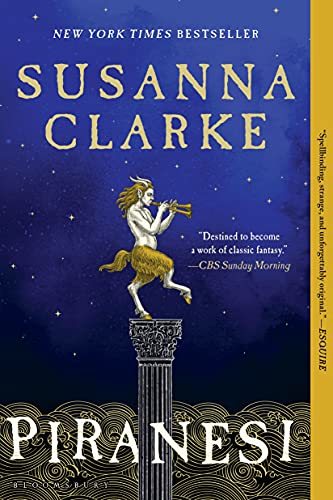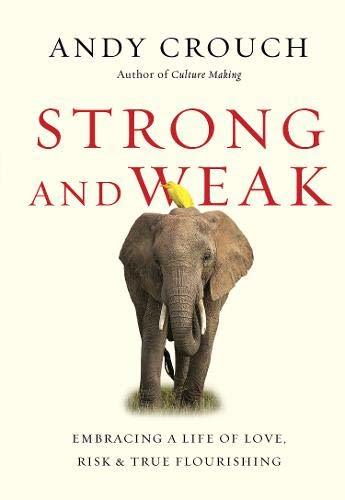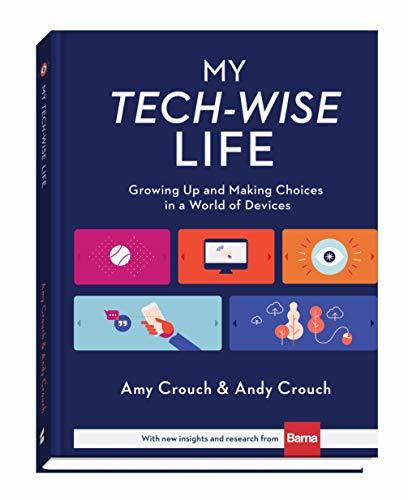Part Three: The Prophet (with the Crouches!)

Title Plate, Imaginary Prisons, Giovanni Batista Piranesi, 1761
Do you trust the House? I ask Myself.— Susanna Clarke, Piranesi
Yes, I answer Myself.
And if the House has made you forget, then it has done so for good reason.
But I do not understand the reason.
It does not matter that you do not understand the reason. You are the Beloved Child of the House. Be comforted.
And I am comforted.
Hello, Friends!
Welcome back to Reading with Joy, my summer book club where we’re reading Piranesi by Susanna Clarke. A few weeks ago, I saw that Andy Crouch (who you may know from Christianity Today, his book Culture Makers, or his work on Praxis Labs) was tweeting about Piranesi. I sent a note to see if he’d like to join in on the book club, and to my great delight, that note resulted in not one, not two, but three insightful (and merry) guests: Andy, Amy, and Timothy Crouch! It turns out that Piranesi made its way through the Crouch clan this year due to some dedicated evangelism on Amy’s part. I felt like I was sitting in on a Crouch family discussion. Each member had such a unique insightful perspective. Listening back through, I was struck by how much we laughed. It was so enjoyable. Listen in at the link above!
In this chapter, we experience an encounter with evil, an acquirement of knowledge, and a loss of innocence.I found Timothy’s description of this chapter very helpful: it is the Genesis three of Piranesi’s story. In chapters one and two, we are introduced to the House, and we cannot help but say, as God does at the end of the creation story, “It is very good.” In Part Three, however, we discover that there is a snake in this garden: the Prophet! In his conversation (if it can be called that) with the Prophet, Piranesi begins to realise that he has forgotten many things and that the Other may not be telling the truth. He resolves to read his old journals, which he thinks may contain hints to his previous life. This discovery begins to erode the edenic peacefulness of Piranesi’s life. He has eaten from the tree of the knowledge of good and evil. He lies to the Other. He practices hiding. He is worried he will go insane.
The Lord God called to Adam, ‘Why are you hiding?’— Genesis 3:9-10
And Adam replied, ‘I heard you coming and didn’t want you to see me naked. So I hid.’
Discussing this chapter with the Crouches was such a joy. I felt like I was merely joining in on a family discussion. Everyone (except me, surprisingly!) had tea. We talked about the wicked Prophet, self-care, naïveté, knowledge, innocence, the difference between opponents and enemies. I’m pulling out a few important points below, but you’ll have to listen into the episode to learn why I will, henceforth, picture Andy Crouch playing a flute made out of a swan bone as he readers his Twitter timeline.
SELF-CARE:“I have resolved to take better care of Myself…”
Piranesi is understandably upset by the realisation that he suffers periods of illness and forgetfulness, and that there is much about his life that he does not understand. He resolves to try to discover the origins on his life in the house, but knowing that it will be very upsetting to him, he engages in activities that sooth and care for both his body and soul. He eats, he mends his socks, he plays his pipe, and he visits the statues.
“Their Beauty soothed me and took me out of Myself; their noble expressions reminded me of all that is good in the World.”
There is something so wise and beautiful in this. In our world of constant disaster and newsfeeds, it is so tempting to binge-watch the world burn. As we scroll through hate, bitterness, loss, and irony, we can become benumbed, cynical, or depressed. What if instead of constantly exposing ourselves to the horrors of the world, we went the way of Piranesi: tending to our physical needs, reminding ourselves of all that is good in the world, and playing our flute made from the bone of a swan.
Sorrow can be alleviated by good sleep, a bath and a glass of wine— Thomas AquinasKNOWLEDGE:
In my conversation with Malcolm Guite, we discussed how Piranesi and the Other model two different postures toward knowledge: knowledge as power, and knowledge as relationship. This theme is continued in Piranesi’s conversation with the Prophet, but in this chapter we also see knowledge as a loss of innocence. As Piranesi realises his forgetfulness, we feel sorrowful, knowing that his remembering might bring about horrific realisations. Nonetheless, we want Piranesi to be safe, and so we want him to thinking clearly, to remember, and, perhaps most pressingly, to protect himself from the Other and the Prophet.
This tension brings with it an important question: can Piranesi retain the beautiful, gentle relationship he has with The House if he finds out what is really going on? Can Piranesi discover what Paul Ricoeur describes as the “second naïveté,” the return not merely to belief, but childlike acceptance and love. Is it possible for Piranesi? Well, we can’t help but hope so…
IMAGINARY PRISONS:While we’re on the subject of knowledge we may not be able to recover from, there’s something I haven’t been telling you all: Piranesi was a historical figure who is famous for having created imaginary prisons (and also for attempting to reclaim the foregone glory of the ancient romans)… seem important? perhaps?
Watch this fascinating lecture to learn more:
That’s all for this week, friends! In case you’ve forgotten, or this is your first week, this is how the book club works: We’ll read one chapter each week. I’ll post a podcast with a friend where we discuss the chapter (this week it’s with my brother Joel!). Then I’ll post discussion questions on Instagram, Twitter, and Facebook, where you can chime in with your ideas, opinions, thoughts and questions. That’s it! That’s all it involves! At least online. I always enjoy the discussions that take place in the comments, but I also strongly encourage you to start a real life bookclub!
Don’t forget to read through the last few weeks of discussions on Twitter, Facebook, and Instagram… they’ve been illuminating!
Till next week, friends!
Joy Marie
May your paths be safe, your floors unbroken, and may the House fill your eyes with Beauty— Susanna Clarke, PiranesiA bit more about this week’s guests…
 Andy Crouch…
Andy Crouch…Is partner for theology and culture at Praxis, an organization that works as a creative engine for redemptive entrepreneurship. His two most recent books—2017's The Tech-Wise Family: Everyday Steps for Putting Technology in Its Proper Place and 2016's Strong and Weak: Embracing a Life of Love, Risk and True Flourishing—build on the vision of faith, culture, and the image of God laid out in his previous books Playing God: Redeeming the Gift of Power and Culture Making: Recovering Our Creative Calling.
Andy serves on the governing boards of Fuller Theological Seminary, the Council for Christian Colleges and Universities, and InterVarsity Christian Fellowship. He also serves as an advisor to The Repentance Project, The Pelican Project, and Revoice. For more than ten years he was an editor and producer at Christianity Today, including serving as executive editor from 2012 to 2016. He served the John Templeton Foundation in 2017 as senior strategist for communication. His work and writing have been featured in The New York Times, The Wall Street Journal,Time, and several editions of Best Christian Writing and Best Spiritual Writing—and, most importantly, received a shout-out in Lecrae's 2014 single "Non-Fiction."
From 1998 to 2003, Andy was the editor-in-chief of re:generation quarterly, a magazine for an emerging generation of culturally creative Christians. For ten years he was a campus minister with InterVarsity Christian Fellowship at Harvard University. He studied classics at Cornell University and received an M.Div. summa cum laude from Boston University School of Theology. A classically trained musician who draws on pop, folk, rock, jazz, and gospel, he has led musical worship for congregations of 5 to 20,000. He lives with his family in Pennsylvania.
 Timothy Crouch…
Timothy Crouch…Is a professional musician and worship leader, as well as an amateur theologian and Bible nerd. He has a degree in classical viola performance from Rice University's Shepherd School of Music, and has served for two years in campus ministry with Chi Alpha Christian Fellowship at Rice. He has recently relocated from Houston, TX to Durham, NC, to begin a Master of Theological Studies at Duke Divinity School, where he plans to study theology & the arts and New Testament.
Amy Crouch …
Is a student at Cornell University studying linguistics, English, and anything else she can fit into her schedule. She wrote a book called My Tech-Wise Life: Growing Up and Making Choices in a World of Devices about how to live with wisdom and intentionality in a culture permeated by screens and apps. She loves to cook, climb mountains, and chat about books.
DISCUSSION QUESTIONS:Piranesi has learned a lot in this chapter, about his world, human nature, his circumstances, much of it unpleasant. Do you think he is handling this information well? How does self-care help him to recover calm? Is he acting wisely?Do you think the House is real? What do you think is going on? Is Piranesi safe? Does he need to leave? Discuss on Facebook Discuss on Instagram Discuss on Twitter Piranesi By Clarke, Susanna Buy on Amazon
Piranesi By Clarke, Susanna Buy on Amazon  Strong and Weak: Embracing a Life of Love, Risk and True Flourishing By Crouch, Andy Buy on Amazon
Strong and Weak: Embracing a Life of Love, Risk and True Flourishing By Crouch, Andy Buy on Amazon  My Tech-Wise Life: Growing Up and Making Choices in a World of Devices By Crouch, Amy, Crouch, Andy Buy on Amazon
My Tech-Wise Life: Growing Up and Making Choices in a World of Devices By Crouch, Amy, Crouch, Andy Buy on Amazon
Joy Marie Clarkson's Blog
- Joy Marie Clarkson's profile
- 227 followers



